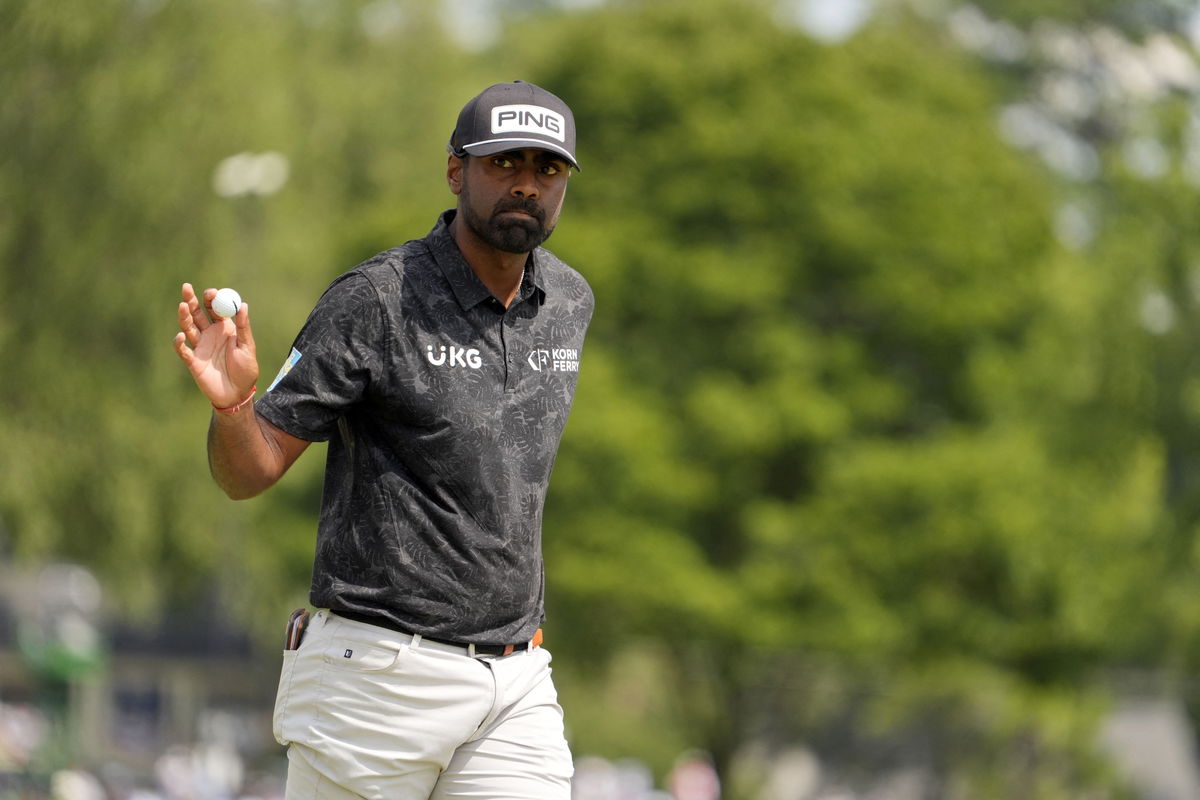
USA Today via Reuters
Aug 31, 2024; Atlanta, Georgia, USA; ; Sahith Theegala waves to the gallery after putting out on the third green during the third round of the TOUR Championship golf tournament. Mandatory Credit: John David Mercer-USA TODAY Sports

USA Today via Reuters
Aug 31, 2024; Atlanta, Georgia, USA; ; Sahith Theegala waves to the gallery after putting out on the third green during the third round of the TOUR Championship golf tournament. Mandatory Credit: John David Mercer-USA TODAY Sports
When Sahith Theegala said that match play is a ‘funny funny thing’, no one batted an eye. “There’s always some Mongolians and things go the ways that you don’t think it would go,” the onetime PGA Tour winner went on to explain. Pardon, Mongolian? What was that?
Watch What’s Trending Now!
There were no Mongolians in the team. The media interaction went on as post-match press conferences go. And Theegala & Co. were in quite the mood. The men in red, white, and blue just subjected the international side to a 5-0 Four-ball humiliation.
Theegala and his partner, Collin Morikawa, had a nervy 1-up victory over Adam Scott & Min Woo Lee. One of those three matches that went to the last hole. Yet, nothing explained the ‘Mongolian’ that came out of the Theegala’s mouth.
ADVERTISEMENT
A clarification was sought from Shane Ryan of Golf Digest. “I realize I didn’t say the full phrase. Not race intended or country intended, but Mongolian reversal. I don’t even know how it originated,” Theegala replied.
Sahith Theegala mentioned there were a couple “mongolians” out there during his match today. The great @ShaneRyanHere asked him to clarify what that meant, and Theegala handled it perfectly
“Please don’t cancel me.” pic.twitter.com/35hgMzu4yG
— Christopher Powers (@CPowers14) September 26, 2024
It was from Fred Couples, Sahith Theegala went on to explain, that he heard the term first. In match play, it refers to a comeback. When the team fights back against all odds and turns the table in their favor.
ADVERTISEMENT
Exactly what Morikawa and Theegala did at the Royal Montreal Golf Club. The duo was 1-down till the 11th. The birdies on the 12th and 14th from Morikawa gave them an edge. Theegala held on to it on the 18th green with a clutch birdie. Hence, ‘Mongolian [reversal]’.
Not his fault that the term is far less common than he thought. But in the volatile social media world, a wrong interpretation can ruin a career. Theegala quipped, “Thank you for asking to clarify that. Mongolian reversal, yes. Don’t cancel me, please.” Smart move from the Pepperdine alum. But what about the origin of the term? What does history, or rather, golf lore, say?
ADVERTISEMENT
Top Stories
Tiger Woods’ GF Receives Emotional Message from Daughter Kai Trump After Turning 48

Another PGA Tour Analyst to Leave Golf Channel Days After Cara Banks’ Unexpected Exit – Report

Unexpected Tiger Woods Payout Surfaces in Recently Released PGA Tour Filing

Wishes Pour In From Phil Mickelson and Fans as Akshay Bhatia Ties Knot With Presleigh Schultz

Masters Champion Secures Future With LIV Golf Amid Brooks Koepka Exit Rumors

‘Mongolian reversal’ isn’t as ancient as the name suggests
Sahith Theegala, the first Indian-American to tee up at the Presidents Cup, cited Fred Couples. The 15-time PGA Tour winner does use it occasionally. And, an article from Michael Bamberger on Golf vocabulary also cites Couples as the proponent of this term. We don’t know if the history of the term is nearly as ancient as the history of golf. Best guess is it’s not. But it has certainly spread beyond Couples.
Actually, someone should’ve asked Kevin Kisner too. The assistant captain of the team had used it back in 2021. Kisner was talking about a match with his good friend and playing partner, Charley Hoffman. The four-time PGA Tour winner bogeyed the last hole, whereas Hoffman birdied the last four holes to pip Kisner by one stroke.
ADVERTISEMENT
Kisner’s exact words as quoted by Jason Sobel at Action Network: “We’ve had some Mongolian reversals down the last hole. Birdies or bogeys on the last hole.” Is it California slang? Maybe not. Theegala and Couples were both born in California. But not Kevin Kisner.
So, where did it originate? Certainly not from Genghis Khan’s mouth. The Mongolian emperor died in 1227. While the earliest known history of Golf is debatable, even by liberal estimates it doesn’t date back to the early 13th century. The first documented mention of the term ‘Golf’ is found in the edict of King James II from March 6, 1457. So, there is still a slight chance that Fred Couples might be the fountainhead. Or, at least the one who popularized it among Tour pros.
ADVERTISEMENT
ADVERTISEMENT
ADVERTISEMENT

